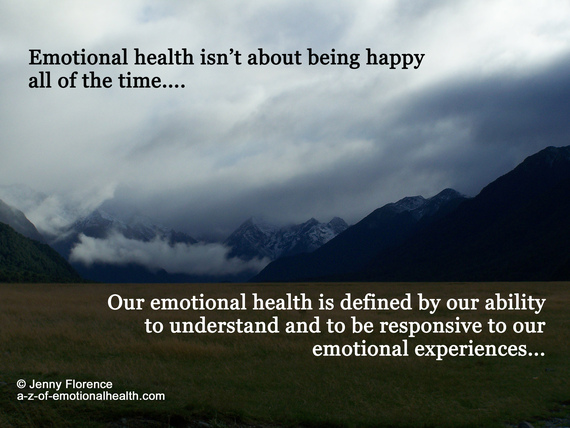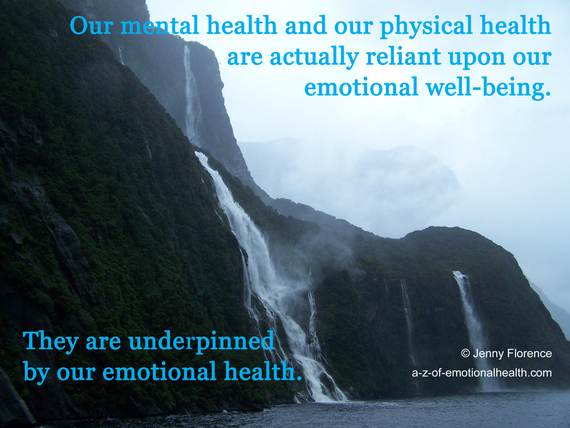Just a few days ago somebody asked me what I actually meant when I used the term emotional health. Now I found this really interesting because this was someone that I would have considered to be pretty emotionally aware, tuned into both their own feelings as well as the feelings of others and emotionally sensitive and very empathic. From this conversation, I realized that there isn't really much of a common language or a vocabulary that defines emotional health or talks about it in a way that is widely understood.
We use the term mental health and of course we talk about physical health, but we very rarely talk about emotional health. And yet our emotions are absolutely integral to the way in which we relate and engage with our world.
When we talk about mental health issues, we are not just talking about the way that we think. We are talking about the way that we feel, and the way that our feelings affect us. And I think it's fair to say that we all know that if we are feeling emotionally stressed or emotionally vulnerable or unstable that this will have a massive impact on our physical health as well. To have a healthy mind we need to be in a healthy emotional state, we need to be feeling alright, and this in turn affects our physical health and well-being as well. So both our mental health and our physical health are actually reliant upon our emotional well-being. They are underpinned by our emotional health.
When we talk about being mindful and teach people about mindfulness, what we are actually trying to do is to enable them to train their mind to be more reflective and more aware of what's going on, both in and around them and to develop their ability to listen to both themselves as well as to others. And it's our emotions, our feelings, that are informing this process.
I have met many people who are in a state of emotional crisis and the one common denominator that I find, regardless of individual circumstances, is that every single person is struggling to relate to what they are feeling and to understand their emotional experiences. Even when their feelings are completely appropriate and a natural response to the kind of things that are taking place in their world at that time, they feel emotionally overwhelmed and don't know how to handle this or how to cope. They lack an understanding of the way that they feel and they have no emotional language and no emotional vocabulary that will enable them to relate, understand and engage with what's actually going on for them.
Our emotions are always live, they're always online, all of the time, and the way that we feel is actually continually informing us. Our emotions and our emotional experiences are a kind of navigational system. We have a continual emotional interaction with whatever is going on around us as well as an emotional response to this. But if we have no emotional language and we haven't learned to relate to our experiences or listen to what we are feeling, then we won't know how to interpret this information. We'll be lacking a vital skill that will enable us to navigate our lives and our life experiences successfully and with relative ease.
Our emotions also fuel our actions. Sometimes people get into very deep water because they find themselves being very emotionally reactive. They react without thinking as if they lack a kind of internal pause button. Our emotions generate a huge amount of energy and this kind of reactive living is always highly emotionally charged. When we are able to take action that's reflective, thoughtful and based in choice rather than generating emotionally charged re-actions life tends to run much more smoothly. Again when we talk about being mindful what we are trying to do is to enable our mind to take charge and channel this emotional energy. We want our mind to consciously take charge of our actions.
In our adult lives, the relationship between our mind and our emotions is the most influential relationship that we will ever have. The health of any relationship will be reliant upon a good level of communication and this actually includes the relationship that we have with ourselves and the way that we relate with our emotions.
To be able to live a full and emotionally rich life we need a strong healthy relationship with our emotional experiences and to do this we will need to develop an emotional language, a fluent emotional vocabulary that will enable a strong healthy level of active communication with ourselves.
Language is descriptive and it creates a link between experience and thought. It helps us to define something, make sense of it and to hold it in our mind. It enables us to gain a greater understanding or a greater comprehension of something. Having an emotional language and an emotional vocabulary is a valuable life skill that we need to have in our toolkit. It creates the link between our emotions and our mind and is crucial to our emotional health and well-being.

Emotional health isn't about being happy all of the time. Our emotional health is defined by our ability to understand and be responsive to our emotional experiences, to be able to feel the full range of our emotions and be at ease with this. Happiness doesn't come from blocking out our more uncomfortable feelings. It comes from listening to our feelings and attending to them responsively and this enables us to be resilient and to be okay regardless of what's going on in our world.
To be emotionally healthy we need to be able to relate to the way that we feel and have the full range of our emotional experiences, knowing that we can be confidently vulnerable, at ease with feeling uneasy, and thoughtful and understanding of any of our more challenging emotions.
